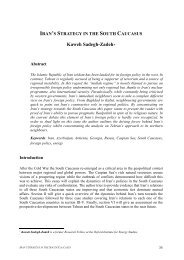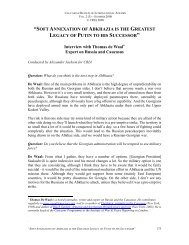Kevin Daniel Leahy - CRIA
Kevin Daniel Leahy - CRIA
Kevin Daniel Leahy - CRIA
- No tags were found...
You also want an ePaper? Increase the reach of your titles
YUMPU automatically turns print PDFs into web optimized ePapers that Google loves.
CAUCASIAN REVIEW OF INTERNATIONAL AFFAIRS<br />
VOL. 4 (3) – SUMMER 2010<br />
© <strong>CRIA</strong> 2010<br />
with organised crime. Both men also enjoyed a somewhat equivocal relationship with Russia’s security<br />
services. In 1995 Basayev stated forthrightly that he had maintained contacts with high-ranking<br />
Russian military officials during his time in Abkhazia. 105 Umarov’s interaction with these agencies has<br />
been detailed earlier.<br />
Yet the differences between the two were equally as fascinating. Ideologically, Umarov and Basayev,<br />
while certainly not at variance, were definitely at different stages of development. In terms of<br />
ideology, Umarov was very much a creation of the first Russo-Chechen conflict. He returned to<br />
Chechnya in 1992 seeking patronage and protection, with no set ideological outlook. Basayev, while in<br />
a sense also a product of the first war, was already familiar with the guerrilla lifestyle; he had seen war<br />
in person and was already committed to the cause of an independent Chechnya. Unlike Umarov, he<br />
had returned to Chechnya by choice, not because he was sought after by Russian prosecutors.<br />
Regardless, in 2004 the two men embarked on a lasting collaboration when Umarov helped Basayev to<br />
organise a raid on government targets in Nazran, Ingushetia’s largest city. It was to prove a hectic<br />
summer for Umarov: in August he was named Maskhadov’s minister for state security (essentially a<br />
shadow reincarnation of his former Security Council portfolio) before later leading a large-scale rebel<br />
raid on Grozny. 106<br />
The precipitant for the next stage in the advancement of Umarov’s political career occurred in March<br />
2005 when Russian Special Forces assassinated Maskhadov in the village of Tolstoy-Yurt, in northern<br />
Chechnya. 107 The previous month, Maskhadov had announced a unilateral ceasefire and called on the<br />
Russian authorities to enter into peace talks with his government. 108 Maskhadov was replaced by his<br />
agreed successor, Abdul-Khalim Sadulayev, an Islamic theologian from Argun, Chechnya. In June,<br />
Sadulayev confirmed the appointment of Doku Umarov as his vice-president, thereby thrusting the<br />
veteran field-commander into the national and international political limelight.<br />
Knowledge of Umarov’s latest promotion was made public only days before he conducted his first<br />
major interview with a non-Chechen journalist, Andrei Babitsky of Radio Free Europe/Radio Liberty.<br />
Babitsky’s interview with Umarov was the first occasion that the new vice-president was subjected to<br />
real journalistic scrutiny and he conducted himself adroitly. 109 In the light of Maskhadov’s death,<br />
Umarov told Babitsky that he was sceptical about his movement’s chances of reaching a political<br />
settlement with the Kremlin. He also criticized the Beslan school siege of September 2004, when<br />
hundreds of school children were taken hostage by guerrillas loyal to Basayev. 110 Umarov’s remarks<br />
were widely interpreted as a negative appraisal of the tactics employed by Basayev’s men at Beslan:<br />
“If we were to use those methods, then I think not one of us would be able to return as normal<br />
humans”. Umarov also stated forthrightly that “in the eyes of the resistance such operations have no<br />
legitimacy”. In hindsight, Umarov’s objections to Basayev’s tactics at Beslan are remarkable given his<br />
105 Dunlop, “The roots of a separatist conflict”, p. 145; Oleg Lukin, “Chechen role in the 1992-3 Georgian-Abkhazian war”,<br />
Prague Watchdog, August 15, 2007, http://www.watchdog.cz/show=000000-000005-000004-000151&lang=1.<br />
106 “Tretiy posle Maskhadova i Basayeva. Kto takoi Doku Umarov”.<br />
107 Musa Muradov & Sergei Mashkin, “Ubit Aslan Maskhadov” [Aslan Maskhadov killed], Kommersant, no. 40, March 9,<br />
2005, http://www.kommersant.ru/doc.aspxDocsID=552963.<br />
108 Charles W. Blandy, “The End of Ichkeria”, Conflict Studies Research Centre, April 2005,<br />
http://www.da.mod.uk/colleges/arag/document-listings/caucasus/.<br />
109 Andrei Babitsky, “Russia: RFE/RL Interviews Chechen Field Commander Umarov”.<br />
110 Timothy Phillips, Beslan: The Tragedy of School No. 1, (Granta Books: Great Britain, 2007).<br />
FROM RACKETEER TO EMIR: A POLITICAL PORTRAIT OF DOKU UMAROV,<br />
RUSSIA’S MOST WANTED MAN<br />
263




